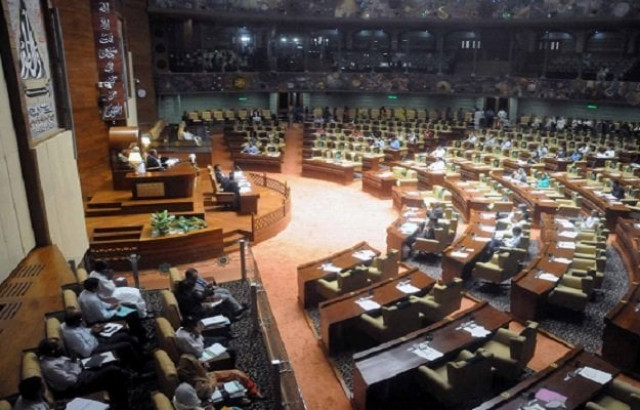Sindh Assembly convened only 10 times in 2020
Many lawmakers opted to stay home during pandemic, or were infected with Covid

The coronavirus plunged the entire world into uncertainty the past year. Routine activities were disrupted, political and social life hit a snag, life as we know it was upended altogether. The Sindh Assembly, infamous, particularly during Pakistan Peoples Party’s tenures in the provincial government, for its strong legislative work but weak implementation process, found itself stagnant for the most part in 2020.
The year 2020 proved to be dismal in terms of governance and parliamentary performance in Sindh. The provincial assembly, a unicameral house of elected representatives of the people of Sindh, could not perform well as many lawmakers opted to remain inside their houses or tested positive for coronavirus. Only 10 assembly sessions were convened in the past year, with a majority of them - except the budget session - adjourning without initial proceedings. Some politicians lamented, however, that the coronavirus became an aid for political maneuvering by the Pakistan Peoples Party-led Sindh government.
“Proceedings continued in only those sessions which benefited the PPP government in terms of legislation, or those in which the ruling party MPAs wanted to adopt resolutions for their vested interests,” remarked Pakistan Tehreek-e-Insaf parliamentary leader Haleem Adil Shaikh.
Shaikh was of the opinion that the government, citing the pandemic as the reason behind its decision, preferred not to summon the assembly season. “Sindh government is now blaming Covid. I want to ask what the PPP government has significantly done in the last 13 years with its powers in Sindh.” He called the incumbent provincial government ‘criminal’ with regards to its governance, which according to him aimed at stealing and embezzling funds.
Meanwhile, speaking to The Express Tribune on the performance of the legislative assembly, Sindh Assembly Secretary GM Umer Farooq said that despite the pandemic, the assembly passed a number of important bills and resolutions coupled with debate on the budget for the year 2020-21. “No doubt Covid affected the proceedings since March 2020,” he conceded. “We adjourned many sessions without taking up the agenda given the severe situation in Sindh in order to save lives of lawmakers and assembly staff.
According to the assembly data, some important bills like ‘The Sindh Epidemic Diseases (Amendment) Bill 2020 was passed with the aim to curb the spread of the pandemic by announcing punishments for those who violated the government-mandated Covid SOPs.
Apart from this, ‘Sindh Covid-19 Emergency Bill 2020’ was passed by the assembly to provide relief to daily wage earners and to those in need, but implementation of the law became a big challenge for the government.
“[The] assembly also passed a landmark bypassing law to seize and freeze schools, dispensaries, and seminaries run by banned outfits,” Farooq said, referring to the Sindh Seized and Freezed Institutions (Madaris and Schools) Bill, 2020 and the The Sindh Seized and Freezed Facilities (Hospitals and Dispensaries) Bill, 2020.
The assembly also passed the Sindh Wildlife Protection, Preservation, Conservation and Management Act, repealing the weaker Sindh Wildlife Protection Ordinance 1972.
Separately, the assembly adopted different resolutions over the passing away of lawmakers Jam Madad Ali, Murataza Balcoh and Syed Ali Mardan Shah, who succumbed to the coronavirus. Other resolutions included the rejection of the controversial Pakistan Island Development Ordinance - promulgated by the Centre - condemnation of harassment of female journalists, honouring members of Sindh Police for their sacrifices toward maintaining law and order in the province, and condemnation of Pakistan Muslim League-Nawaz leader Captain (retd) Safdar’s arrest. Another resolution passed on August 5, 2020, condemned the Indian government’s move to revoke special status of Indian-occupied Jammu and Kashmir.
However, Grand Democratic Alliance MPA Nand Kumar Goklani said that only government agenda was discussed and those bills and resolutions were adopted that we either moved by treasury benches. “Not a single private bill has been passed by the assembly. You can see its performance from it,” he opined.
Not only in the legislation side but the quality of governance also remained a big question in the outgoing year. The performance in health, education, transport, public health engineering department, irrigation, agriculture, women development minorities and other key sector remained below expectation. “Hardly 20 percent development budget of the current fiscal year has so far been utilised. Many schemes in each of the sectors are in doldrums as there is zero per cent utilization of funds on the same,” an official in Sindh finance department sharing the budget details said.
The provincial government already reduced the annual development program (ADP) from Rs208 in 2019-20 to Rs155 billion for the current fiscal year citing the reason for COVID-19. But whatever resources were available, have not been utilised yet.
Similarly, Rs23 billion has been allocated for 192 development schemes for the health department, but only 98 cores are spent so far. The status of dozens of schemes shows zero percent utilization, which means not a single penny has been utilized on the schemes.
The spokesperson for the health department, however, said that the government's focus was on setting up hospitals, high dependency units and isolation centers to deal with COVID cases in the province. “Majority of the funds of various departments were diverted on pandemic related issues,” he said.
Published in The Express Tribune, January 1st, 2021.



















COMMENTS
Comments are moderated and generally will be posted if they are on-topic and not abusive.
For more information, please see our Comments FAQ